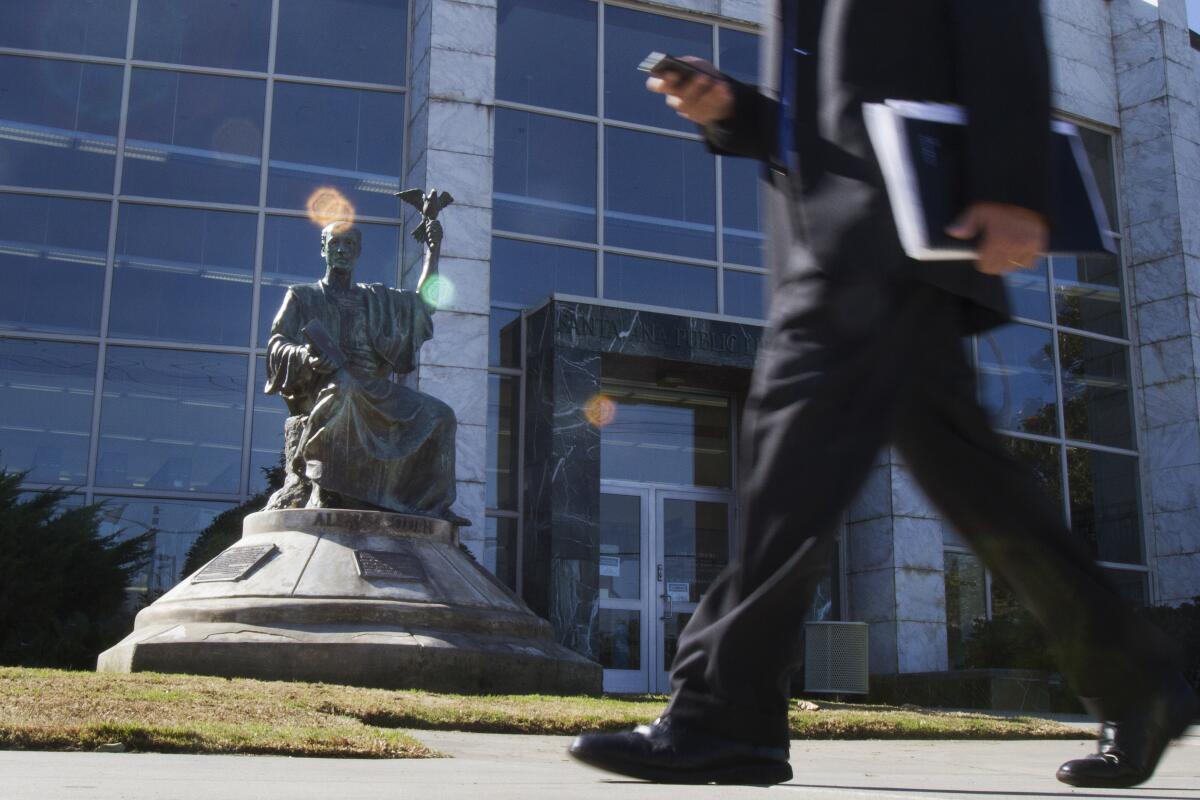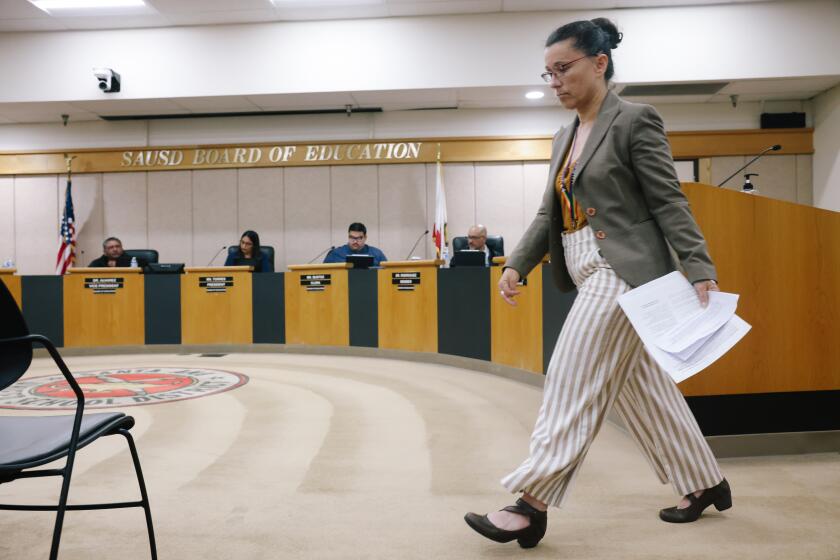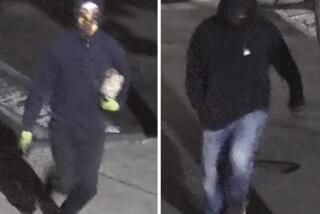Ex-Jewish Defense League bomber’s parole a ‘gut punch’ for Palestinian Americans

- Share via
Nearly 40 years ago, long before the latest conflagration between Israel and Hamas militants, a bomb ripped through the Santa Ana office of the American-Arab Anti-Discrimination Committee, taking the life of the group’s regional director, Palestinian American activist Alex Odeh.
The FBI labeled the bombing a terrorist attack and early on identified the Jewish Defense League as “the possible responsible group.” At the time, the JDL was the focus of numerous state and federal investigations and had gained notoriety as an underground network of radical militants, espousing a violent form of Jewish nationalism that mainstream Jewish leaders rejected.
The FBI never formally charged anyone in Odeh’s death, but for years the agency’s investigation focused on Robert Manning, a burly ex-boxer from Los Angeles, and his wife, Rochelle, both JDL adherents.
With the Odeh probe still underway, Manning was convicted in 1993 of an unrelated murder: a 1980 mail-bomb attack that killed Patricia Wilkerson, a Manhattan Beach secretary. Manning was sentenced to life in prison. And in the ensuing decades, the Odeh case largely went cold.
Since becoming eligible for parole in 2001, Manning tried — and failed — seven times to win release. He appealed the most recent rejection, and on Oct. 3, an appellate board overturned the decision in accordance with a federal law that mandates parole for inmates who have served 30 years of a life sentence and are deemed unlikely to reoffend.
Now 71, Manning is on track to be paroled in July from a federal penitentiary in Phoenix.
The appellate board found that Manning’s “almost spotless record during his 32 years of incarceration made it unlikely he would reoffend.” The decision also took into account Manning’s age and health concerns, according to a U.S. Parole Commission spokesperson.
Paul Batista, an attorney representing Manning, declined to comment and did not make his client available for interview. At a past parole hearing, Manning detailed plans to live with his sister in Los Angeles and sell his prison artwork online if he won release.
Among Arab American leaders, news of Manning’s parole has aggravated the painful wound of Odeh’s still unsolved death, and for some, has reinforced a belief that the American judicial system let them down.
“It was a gut punch,” said Abed Ayoub, national executive director of the American-Arab Anti-Discrimination Committee, a civil rights group created in 1980 to combat anti-Arab stereotypes. “If Manning was truly reformed, then he would cooperate and give law enforcement names of the individuals he worked with or the individuals that he knows were involved in the Odeh assassination. He’s done none of that.”
Ayoub learned of Manning’s parole through the Justice Department’s victim notification system, an alert service for federal crime victims. The decision came just days before the committee hosted its annual memorial banquet for Odeh in Garden Grove.
An Orange County school district’s efforts to introduce lessons on the Israeli-Palestinian conflict have ignited emotional discourse among Jewish and Arab American community groups.
Founded by controversial Rabbi Meir Kahane, the JDL emerged in New York City in 1968 in the wake of the Six Day War between Israel and a coalition of Arab states. Its members embraced a self-appointed mission to aggressively combat antisemitism with swaggering slogans like “every Jew a .22” that over time evolved into terror campaigns against their perceived enemies.
Five terror attacks in 1985 alone led the FBI to warn Arab Americans that they were in a “zone of danger” from an unnamed group taking aim at the “enemies of Israel.”
“To many Jews in North America, they were seen as heinous crimes,” said Alon Burstein, an Israel Institute Fellow and visiting assistant professor in UC Irvine’s political science department. “On the other hand, it was also seen as the first time — with the exception of the state of Israel — that Jews were standing up militantly and saying ‘never again.’ ”
Manning grew up in an Orthodox Jewish household in Los Angeles, where he dropped out of Fairfax High School at 17. He joined the Army only to leave a year later on a “not able to adjust” discharge. He worked variously as a private investigator, machinist and draftsman.
Manning joined the JDL’s West Coast chapter in 1971 and soon ran afoul of the law. He was convicted in the 1972 bombing of an Arab activist’s Hollywood home, and sentenced to three years’ probation after disavowing his JDL affiliation in court.
After the case, he left for Israel, where he renewed his JDL ties and continued to travel back and forth to the U.S.
Federal authorities considered Manning a suspect in four political bombings in 1985, including the one that killed Odeh. One attack killed a suspected Nazi in Paterson, N.J.; another bomb exploded outside the home of a suspected Nazi in Brentwood, N.Y., and a third injured two police officers trying to defuse a bomb sent to an Arab American group in Boston.
But the attack Manning served time for — Wilkerson’s mail-bomb murder — did not appear political in nature. Two years after Manning’s 1993 conviction, a Los Angeles federal jury convicted real estate agent William Ross of paying Manning to carry out the attack. Prosecutors said Ross intended the bomb for Wilkerson’s boss, who had sued Ross over the sale of a Manhattan Beach house, costing him thousands of dollars.
Manning’s wife, Rochelle, whom prosecutors also implicated in the bombing, died in an Israeli prison in 1994 while fighting extradition to the U.S.
With Manning in prison for the Wilkerson murder, the FBI continued to question him in the Odeh bombing. At his last three parole hearings, the Odeh family and representatives of the American-Arab Anti-Discrimination Committee were recognized as victims of Manning and allowed to argue against his release.
During a Nov. 2020 hearing, Manning explicitly denied involvement in the Odeh bombing and challenged the government to bring a case. “If they say I’m the top subject, then charge me for it, and I’ll go to court and prove my innocence,” he said.
Last year, Manning sued the government for allowing the Odeh family and the Arab committee to participate in his parole hearings. A judge dismissed the suit in February.
Odeh’s eldest daughter, Helena, said being recognized as victims at Manning’s parole hearings had brought her family some comfort. Now, with him set to be paroled, even that half-measure of justice seems to be slipping away.
“It does seem like we’re taking a step back,” Helena said. “But we’re going to continue to fight for justice and hope that my dad’s murder is solved. He didn’t deserve to die the way that he did.”
Odeh was seen as a polite, soft-spoken voice of moderation in his day. He was a poet and lecturer at Coastline College in Orange County, as well as West Coast director for the American-Arab Anti-Discrimination Committee. He held an unwavering commitment to Palestinian statehood as a prerequisite for peace in the Mideast.
With the Israel-Hamas war exploding anew, Helena said she is thinking of her father more often than usual.
“I wonder what he would do or say in this situation,” she said. “I know he wouldn’t want innocent people getting hurt all around.”
More to Read
Sign up for Essential California
The most important California stories and recommendations in your inbox every morning.
You may occasionally receive promotional content from the Los Angeles Times.












